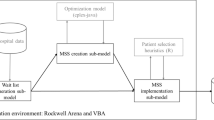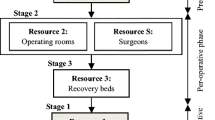Abstract
Most surgery scheduling is done 1 day in advance. Caused by lack of overall planning, this scheduling scheme often results in unbalanced occupancy time of the operating rooms. So we put forward a rolling horizon mixed integer programming model for the scheduling. Rolling horizon scheduling refers to a scheduling scheme in which cyclic surgical requests are taken into account. Surgical requests are updated daily. The completed surgeries are eliminated, and new surgeries are added to the scheduling list. Considering day-to-day demand for surgery, we develop a non-rolling scheduling model (NRSM) and a rolling horizon scheduling model (RSM). By comparing the two, we find that the quality of surgery scheduling is significantly influenced by the variation in demand from day to day. A rolling horizon scheduling will enable a more flexible planning of the pool of surgeries that have not been scheduled into this main blocks, and hence minimize the idle time of operating rooms. The strategy of the RSM helps balance the occupancy time among operating rooms. Using surgical data from five departments of the West China Hospital (WCH), we generate surgical demands randomly to compare the NRSM and the RSM. The results show the operating rooms’ average utilization rate using RSM is significantly higher than when applying NRSM.


Similar content being viewed by others
References
Prasanna Devi, S., Suryaprakasa Rao, K., and Sai Sangeetha, S., Prediction of surgery times and scheduling of operation theaters in Optholmology Department. J. Med. Syst. 36:415–430, 2012.
Macario, A., Vitez, T. S., Dunn, B., and McDonald, T., Where are the costs in perioperative care? Analysis of hospital costs and charges for inpatient surgical care. Anesthesiology 83(6):1138–1144, 1995.
Mehdi, H., and Asie, S., Predictive/Reactive Planning and Scheduling of a Surgical Suite with Emergency Patient Arrival. J. Med. Syst. 40:30, 2016.
Patterson P. Is an 80% to 85% utilization a realistic target for ORs? OR Manager, 1997.
Hamilton, LR. Case study: review of operating room utilization at Naval Hospital Jacksonville. Thesis, Baylor University, USA. 2003.
Fei, H., Meskens, N., and Chu, C., A planning and scheduling problem for an operating theatre using an open scheduling strategy. Comput. Ind. Eng. 58(2):221–230, 2010.
Denton, B.T. (Ed.), Handbook of Healthcare Operations Management: Methods and Applications. International Series in Operations Research & Management Science. 184, 2013.
Guerriero, F., and Guido, R., Operational research in the management of the operating theatre: a survey. Health Care Manag. Sci. 14(1):89–114, 2011.
Denton, B. T., Miller, A. J., Balasubramanian, H. J., and Huschka, T. R., Optimal allocation of surgery blocks to operating rooms under uncertainty. Oper. Res. 58(4):802–816, 2010.
Dexter, F., Wachtel, R. E., Epstein, R. H., Ledolter, J., and Todd, M. M., Analysis of operating room allocations to optimize scheduling of specialty rotations for anesthesia trainees. Anesth. Analg. 111(2):520–524, 2010.
Min, D. K., and Yih, Y., An elective surgery scheduling problem considering patient priority. Comput. Oper. Res. 37(6):1091–1099, 2010.
Min, D. K., and Yih, Y., Scheduling elective surgery under uncertainty and downstream capacity constraints. Eur. J. Oper Res. 206(3):642–652, 2010.
Persson, M. J., and Persson, J. A., Analysing management policies for operating room planning using simulation. Health Care Manag. Sci. 13(2):182–191, 2010.
Roland, B., Di Martinelly, C., Riane, F., and Pochet, Y., Scheduling an operating theatre under human resource constraints. Comput. Ind. Eng. 58(2):212–220, 2010.
Zonderland, M. E., Boucherie, R. J., Litvak, N., and Vleggeert-Lankamp, C., Planning and scheduling of semiurgent surgeries. Health Care Manag. Sci. 13(3):256–267, 2010.
Vissers, J. M. H., Bertrand, J. W. M., and De Vries, G., A framework for production control in health care organizations. Prod. Plan. Control. 12(6):591–604, 2001.
Blake, J. T., and Donald, J., Mount Sinai hospital uses integer programming to allocate operating room time. Interfaces 32(2):63–73, 2002.
Van Oostrum, J. M., Van Houdenhoven, M., Hurink, J. L., Hans, E. W., Wullink, G., and Kazemier, G., A master surgical scheduling approach for cyclic scheduling in operating room departments. OR Spectr. 30(2):355–374, 2008.
Al-Ameri, T. A., Shah, N., and Papageorgiou, L. G., Optimization of vendor-managed inventory systems in a rolling horizon framework. Comput. Ind. Eng. 54(4):1019–1047, 2008.
Herring, W. L., and Herrmann, J. W., A stochastic dynamic program for the single-day surgery scheduling problem. IIE Trans. Healthc. Syst. Eng. 1(4):213–225, 2011.
Addis, B., Carello, G., Grosso, A., Tànfani, E. Operating room scheduling and rescheduling: A rolling horizon approach. Flex. Serv. Manuf. J.:1–27, 2015.
Herring, W. L., and Herrmann, J. W., The single-day surgery scheduling problem: Sequential decision-making and threshold-based heuristics. OR Spectr. 34:429–459, 2012.
Acknowledgments
This work was partially supported by the National Natural Science Foundation of China under Grants 71131006, 71532007, 71172197, and the Fundamental Research Funds for the Central Universities skgt201202.
Author information
Authors and Affiliations
Corresponding author
Additional information
This article is part of the Topical Collection on Patient Facing Systems
Rights and permissions
About this article
Cite this article
Luo, L., Luo, Y., You, Y. et al. A MIP Model for Rolling Horizon Surgery Scheduling. J Med Syst 40, 127 (2016). https://doi.org/10.1007/s10916-016-0490-9
Received:
Accepted:
Published:
DOI: https://doi.org/10.1007/s10916-016-0490-9




